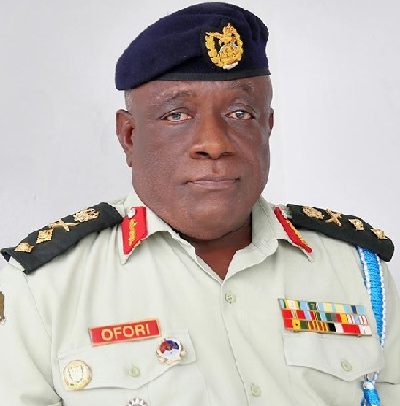Major General Francis Ofori
Major General Francis Ofori, Commander, Kofi Annan International Peace Keeping Centre (KAIPC), has disclosed that the Gulf of Guinea is currently the world’s leading hotspot for piracy, kidnapping and armed robbery at sea.
According to him, the International Maritime Bureau (IMB)’s first quarter report of 2020 revealed that there had been a 25 per cent increase in piracy and armed robbery worldwide compared to 2019 figures of the same quarter.
“Additionally the Gulf of Guinea accounted for approximately 90 per cent of global kidnappings with 49 crew members kidnapped in nine separate incidents.
“The modus operandi of the pirates indicates a noticeable shift from oil theft towards kidnapping for ransom,” he noted.
Opening a pilot course on ‘Developing a Maritime Security Culture in the Gulf of Guinea’ in Takoradi recently, Major General Ofori said, “This is buttressed by 2019 and 2020 figures which indicated a big climb in the number of kidnapping incidents in the region, and an increase in the number of hostages being taken overall.”
He said the concerns about oil installations, container traffic and tanker movements through the region were genuine, and added that other maritime crimes existed alongside piracy in the Gulf of Guinea.
He mentioned some of them as illegal, unreported and unregulated fishing, human trafficking and migrant smuggling, marine pollution or toxic waste dumping as well as illicit trade in arms, drugs, contraband and maritime terrorism.
“These illegal activities exploit the inadequate control of the region’s maritime domain, which revolves around inadequate law enforcement capacity,” he said.
The pervasiveness of maritime security threats across the region therefore illustrated the need for a holistic approach to maritime security response in the region, he said.
Commodore (Rtd) Albert Bentil Addison, in his welcome address, said Takoradi and its environs had had its fair share of maritime challenges ranging from piracy and armed robbery at sea, unregulated fishing, human smuggling and illegal bunkering.
The Danish Ambassador to Ghana, Thomas Raahauga Norup, said the training would cover topics on illegal and policy frameworks on maritime security and security threat response in the Gulf of Guinea.
The pilot course is the first of the capacity building outputs project on, “Enhancing regional research, capacity building and convening of stakeholders towards a safer maritime domain in the Gulf of Guinea.”
It was attended by people with diverse backgrounds including the navy, judiciary, marine police, fisheries commission, private shipping companies and civil society organizations.
From Emmanuel Opoku, Takoradi

